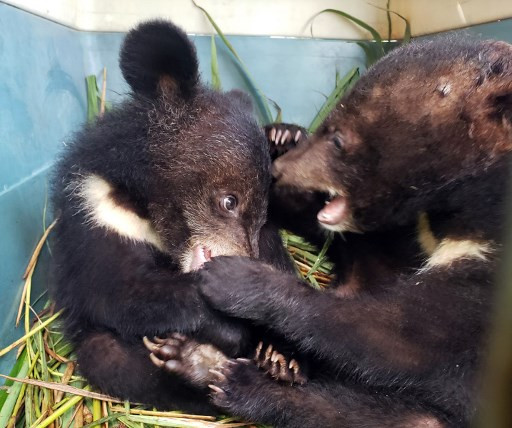Asiatic black bear cubs rescued in remote Laos
Across Asia thousands of the animals, classified as vulnerable on the IUCN Red List of endangered species, are kept in cages as pets and used to extract bile from their gall bladders for traditional medicine.
Change Size
 This handout from Free the Bears taken on August 19, 2019 and released on August 26, 2019 shows two Asiatic black bear cubs after they were rescued in Luang Namtha province. Five endangered Asiatic black bear cubs were rescued from a remote stretch of Laos near the Chinese border and are being nursed back to health at a sanctuary, NGO Free the Bears said on August 26, calling the one-day rescue the largest in its 24-year history.
(AFP/Free The Bears)
This handout from Free the Bears taken on August 19, 2019 and released on August 26, 2019 shows two Asiatic black bear cubs after they were rescued in Luang Namtha province. Five endangered Asiatic black bear cubs were rescued from a remote stretch of Laos near the Chinese border and are being nursed back to health at a sanctuary, NGO Free the Bears said on August 26, calling the one-day rescue the largest in its 24-year history.
(AFP/Free The Bears)
F
ive Asiatic black bear cubs were rescued from a remote stretch of northern Laos and are being nursed back to health at a sanctuary, NGO Free the Bears said Monday, calling the one-day rescue the largest in its 24-year history.
Across Asia thousands of the animals, classified as vulnerable on the IUCN Red List of endangered species, are kept in cages as pets and used to extract bile from their gall bladders for traditional medicine.
Working with Laos police, the team swept in on three different locations in Luang Namtha province near the Chinese border last week.
The cubs were weak and malnourished after being fed on mainly rice porridge but are now "doing well", NGO spokesman Rod Mabin told AFP.
"For the first day or so they were a bit picky as they adjusted to the milk but now they are fully adjusted."
He added that they would be in quarantine for a month at a sanctuary near the tourist town of Luang Prabang before being introduced to a nursery enclosure.
The cubs were found in a bamboo paper factory, a cassava plantation, and a private household.
All owners claimed to have purchased them from villagers, but in Laos it is now illegal to keep the bears, trade their parts or extract bile.
Wildlife authorities in Laos and Vietnam have cracked down on the painful and invasive practice but bear bile farming still persists.
Many of the creatures, also known as moon bears, are starved, dehydrated, wounded and psychologically scarred when they are rescued.
The Asiatic black bear population is also threatened by habitat loss.
The NGO has rescued 11 bears so far this year and are on track to beat their total of 13 in 2018.
Authoritarian Laos has also long been a top transit hub for the smuggling of wildlife products, including pangolins, helmeted hornbills and tiger parts.
Widespread corruption and weak law enforcement allows the criminal activity to flourish.






